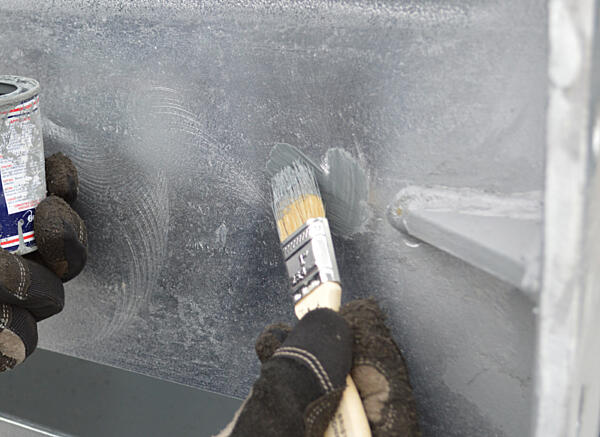Zinc-Rich Paint

Zinc-rich paint (Figure 56) is applied to a clean, dry steel surface by either a brush or spray, and usually contains an organic binder pre-mix. Zinc-rich paints must contain either between 65% to 69% or greater than 92% metallic zinc by weight in dry film. Paints containing zinc dust are classified as organic or inorganic, depending on the binder they contain. Inorganic binders are particularly suitable for paints applied in touch-up applications around and over undamaged hot-dip galvanized areas.
Surface Preparation
According to ASTM A780, the surface to be repaired shall be blast cleaned to SSPC-SP10/NACE No.2 near white metal for immersion applications and SSPC-SP11 near bare metal for less aggressive field conditions. When blasting or power tool cleaning is not practical, hand tools may be used to clean areas to be reconditioned. The blast cleaning must extend into the surrounding, undamaged, galvanized coating.
Application
This method of repairing galvanized surfaces must take place as soon as possible after preparation is completed and prior to the development of any visible oxides. The spraying or brushing should be in an application of multiple passes and must follow the paint manufacturer's specific written instructions. In addition, proper curing of the repaired area must occur before the product is put through the final inspection process. This repair can be done either in the galvanizing plant or on the job site and is the easiest repair method to apply because limited equipment is required. Zinc-rich painting should be avoided if high humidity and/or low temperature conditions exist because adhesion may be adversely affected.
Final Repaired Product
The coating thickness for the paint must be 50% higher than the surrounding coating thickness, but not greater than 4.0 mils, and measurements should be taken with either a magnetic, electromagnetic or eddy current gauge. Finally, the surface of the painted coating on the repaired area should be free of lumps, coarse areas, and loose particles.